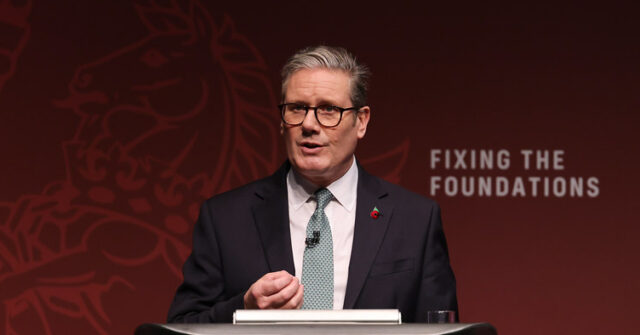In merely 115 days since assuming office, Sir Keir Starmer, leader of the UK Labour Party, has witnessed a dramatic collapse in his approval ratings amidst a profoundly pessimistic public sentiment. Starmer, who ascended to leadership in July following an election with the lowest popular vote in nearly a century, initially gained a net approval score of +11. This indicated a modest surplus of public support, with more citizens expressing approval than disapproval. However, this initial goodwill has evaporated, leading to a staggering 49-point drop in his net approval, which now stands at -38. This sharp decline has set a record in terms of speed for modern British Prime Ministers; Starmer’s trajectory starkly contrasts with that of his predecessor, Sir Tony Blair, who enjoyed a high approval rating after his landslide victory in 1997 and remained positively rated for years thereafter.
Starmer’s swift decline is even more pronounced when compared to the performance of past Conservative leaders, such as Boris Johnson, who managed to increase his popularity in the year following his election. The unprecedented downturn in Starmer’s approval has raised eyebrows, with Luke Tryl, the executive director of More in Common, describing it as a remarkable shift that reflects a variety of issues affecting public opinion. Factors contributing to the erosion of trust in Starmer’s government reportedly include controversial decisions like withdrawing winter heating support for the elderly, the controversial mass release of prisoners, and visible missteps such as government officials accepting freebies and donations. These events have cultivated a negative perception of Starmer’s leadership and his administration’s priorities.
As Starmer grapples with an increasingly skeptical public, he faces the imminent presentation of a so-called “punishment budget,” which will outline the tax, borrowing, and spending principles for the forthcoming fiscal year. Despite his attempts to frame the planned tax hikes as necessary for the country’s welfare, Starmer’s position is precarious. A recent poll conducted by More in Common suggests that a majority of the public, approximately 53%, believes that the government should prioritize lower taxes, while only 32% support increased investment in public services. This divide places Starmer’s government in a challenging predicament, as they must balance fiscal strategies that align with public sentiment while adhering to their policy goals.
The impending budget could ultimately shape public opinion even further, with prevailing sentiments indicating that many citizens expect disappointment. Findings from More in Common reveal that 56% of respondents believe Rachel Reeves, Starmer’s Treasury spokesperson, can manage to avoid both tax increases and spending cuts in the budget. This expectation not only indicates public skepticism toward Starmer’s economic policies but also reflects a desire for accountability and tangible results from the Labour government. If such expectations are unmet, public trust in the government’s ability to manage economic challenges could diminish further, heralding dire consequences for Starmer’s administration.
Beyond immediate fiscal concerns, a broader democratic crisis looms over the United Kingdom, with public confidence in its political system rapidly eroding. According to More in Common, less than a third of Britons feel that democracy is functioning effectively, and only one in five believes that politicians are adequately addressing the pressing challenges facing the nation. This widespread disillusionment poses significant risks for Starmer’s Labour Party, as failure to effectively address citizens’ concerns may drive more voters away from traditional political institutions, further alienating them from mainstream engagement.
In summary, Sir Keir Starmer’s leadership has encountered a perilous start, characterized by plummeting approval ratings amid a skeptical and disillusioned public. Faced with the daunting task of orchestrating an effective budget that conforms to citizens’ desires while ensuring economic stability, Starmer must also confront the deeper issue of public faith in democracy itself. As he navigates this tumultuous political landscape, the outcomes of his administration’s policies and decisions will be crucial in determining whether Labour can restore public confidence and reinvigorate support for mainstream politics in the United Kingdom. Without a concerted effort to realign the government’s objectives with the expectations of the populace, Starmer may solidify a narrative of decline within the Labour Party, jeopardizing its relevance in an increasingly complex political environment.

